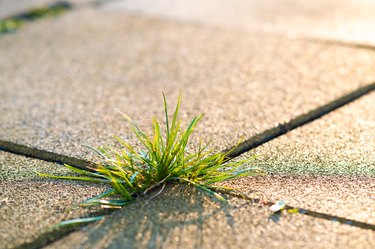
Weeds manage to pop up just about anywhere, such as in the small cracks in a driveway or between patio pavers. These pesky pop-up weeds are often surprisingly difficult to remove by hand since the only way to really get rid of a weed is to remove it, roots and all. While you can use bleach to kill weeds in areas where you'd prefer nothing to grow, it's not a great choice for the environment, as it eventually ends up in the soil, altering its pH level and killing beneficial microbes within the soil.
Bleach as Weed Killer
Video of the Day
Bleach has a reputation as a good germ killer; after all, people use it when cleaning surfaces as well as when sanitizing garden tools. It's also an effective nonselective weed killer, which means that in large concentrations, it's capable of killing any relatively small plants, including the ones you like. Bleach would never be a good idea for weeds on the lawn, for instance, because it would kill the surrounding grass and damage the soil, making it difficult or impossible for new grass to grow there for some time.
Video of the Day
Bleach sprayed onto difficult weeds in the driveway, between patio pavers, or on paved walkways makes more sense since there are no desirable plants growing in those areas, but you may want to consider alternatives that are less harmful to humans and the environment in general. Bleach may also burn the skin and isn't good for the respiratory tract if its fumes are inhaled in strong concentrations.
Sprayed directly on a small patio weed, bleach starts taking its toll almost immediately, withering the leaves and eventually killing the plant. The dead weed still has to be pulled out from between the cracks, however. One downside to spraying a series of patio or driveway weeds with bleach is that the bleach could cause whitening of the surrounding pavers or concrete. If it rains later that day or if you spray a garden hose over the treated area, bleach water may end up washing off the driveway and reaching edges of your or your neighbor's lawn, killing some of the grass.
Getting Rid of Patio Weeds
Though spraying a small line of weeds one time with bleach may not have a huge effect on the environment, it's best to find alternative ways to deal with those stubborn, unwanted plants. If at all possible, pull them up by hand before they become unmanageable. Otherwise, try a narrow weeding tool designed for crevices; it slips easily between paver slabs or within cracks in the driveway to help yank out those tougher weeds.
In a pinch, boiling water from a kettle poured directly over the weeds also works. This technique requires extreme caution so you don't splash the water onto your feet. Squat down relatively close to the weeds before pouring the hot water onto them and into the cracks. The downside is that it requires more than one kettle of boiling water to scorch a lot of weeds. A mixture of 1 part salt to 2 parts water is another solution to spray on weeds; it kills them by dehydrating them. Keep in mind that salt also affects the soil, so only use it in areas where no desirable plants grow.